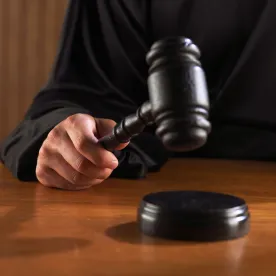George Morris was considered an icon in equestrian sports. He won the team silver medal in show jumping at the 1960 Rome Olympics, and is considered a founding father of hunt seat equitation. Morris was chef d’equipe for the United States Equestrian Show Jumping team from 2005 until 2013; and the team won Olympic gold at the 2008 Hong Kong games under his leadership. He also served as chef d’equipe for the Brazilian show jumping team at the 2016 Rio Olympics.
Yet on Nov. 19, 2019, the U.S. Center for SafeSport (Center) permanently banned Morris, then 81 years old, from all equestrian sports for violations of the SafeSport Code. The violations stemmed from allegations of sexual misconduct involving a minor occurring 50 years ago. The Center has exclusive jurisdiction over allegations of sexual misconduct within the U.S. Olympic & Paralympic Committee, and the individual sports National Governing Bodies (NGBs). The NGB for Equestrian Sports in the United States is the U.S. Equestrian Federation (USEF), now known as USA Equestrian. Morris unsuccessfully appealed the Center’s ruling.
SafeSport’s Code contains no statute of limitations on reporting claims of abuse. Anyone who comes forward to report abuse will be heard, regardless of when the abuse is alleged to have occurred. The type of prohibited abuse that can cause an individual to be permanently banned from a sport by the Center or an NGB includes conduct deemed unlawful under criminal and civil laws. However, the Center and the NGBs do not have the authority to exact civil or criminal penalties. And, SafeSport’s Code does not shield an individual found to have engaged in prohibited conduct from criminal prosecution, or from a subsequent civil suit by the victim for money damages.
On Aug. 5, 2020, two of the men who initiated the claims against Morris through the SafeSport Center filed lawsuits in Manhattan Supreme Court against Morris and USEF seeking damages for negligence, sexual assault of a minor, and emotional distress. The lawsuits were filed under New York’s new Child Victims Act (CVA), enacted into law on Feb. 14, 2019. The CVA extends the statute of limitations for survivors of child sexual abuse in criminal and civil cases. See NYCPLR §§ 214-G, NYCPL 30.10(3)(f). Before the CVA became law survivors of child sexual abuse had from one to five years to bring a civil lawsuit against their abuser(s) in New York beginning once the victim turned 18. It has long been recognized, however, that it is very difficult for survivors of child sexual abuse to come forward, or even come to terms with the trauma, until many years later. As a result, many survivors could not pursue a claim for damages because the one to five years limitations period expired by the time they were emotionally and otherwise ready to file suit.
The CVA helps survivors of child sexual abuse by extending the statute of limitations in civil cases so that survivors can file a claim for damages until they are 55 years old. The CVA now allows survivors who were unable to file a lawsuit under the old law to file their lawsuit during a one-year “look back” period. This means that a civil case barred under the old statute of limitations could now be filed within this one-year look back period, which began six months after the governor signed the CVA into law on Feb. 14, 2019. However, due to the COVID-19 pandemic, the look back period has been extended until Aug. 14, 2021.
Since its inception in 2017, SafeSport has sparked significant, and often emotional, debate in the equestrian community. Detractors often point to the absence of a statute of limitations under SafeSport’s Code as inherently unfair to individuals accused of prohibited conduct, since it allows complaints to be filed based on allegations that can be decades old which may be difficult to defend due to the passage of time. The CVA, however, which also extends the statute of limitations for survivors of child sexual abuse to file a civil action for damages, is consistent with SafeSport’s Code. Both are designed to address the unique harms suffered by victims of childhood sexual abuse. And while these long limitations periods may present real challenges for those accused of perpetrating the abuse, in the end, whether a decades-old claim of sexual abuse is adjudicated before the SafeSport Center, or in the New York courts under the CVA, the outcome will necessarily turn on the quality of the evidence and the credibility of the witnesses presented by the parties.



 />i
/>i
